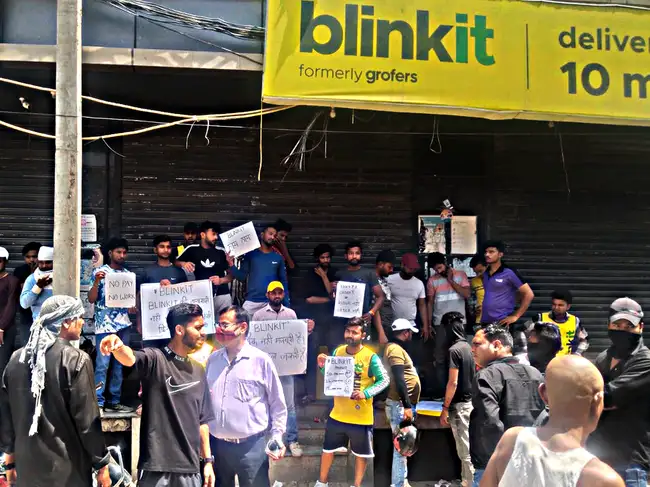In a report published by consultancy firm Bain and e-commerce giant Flipkart, India’s quick commerce sector accounted for over two-thirds of all e-grocery orders last year, with its total market share growing about five times to $6-7 billion from 2022. This growth is often cited as a reflection of changing consumption patterns in India. Every company seems eager to tap into this booming market, driven by a rising demand for convenience and shifting aspirations.
One trend that stands out is how convenience has become a dominant factor in consumer choices. While convenience culture is commonly analysed in the American context, where it is tied to values of individualism and independence, its role in India cannot be viewed in isolation from the caste system. Choosing convenience is not just a preference; it reflects a deeper societal structure. The caste system, with its encoded hierarchy, shapes the modern sense of entitlement to time and how it is spent. Behind the veil of convenience is a gruelling drill of gig workers who meander through the traffic to meet incentives laid down by the apps.
The caste of convenience
When we study the nature of choices that consumers make instead of studying the subject of those choices, it tends to paint an incomplete picture. The appetite for convenience, therefore, cannot be meaningfully studied without centring who possesses the appetite. Otherwise, we risk positioning convenience as an egalitarian option that everyone gets to make. Which is not true.

In a caste-stratified society like ours, entitlement is directly proportional to one’s position in the all-pervasive social hierarchy. The higher the order, the more the privilege, the more the entitlement. A modern-day manifestation of this entitlement is the desire to ‘buy time’ through services; this is not just aspirational.
For the privileged, their time is of supreme importance, one that should not be used for standing in lines or doing menial tasks. The ability to outsource everyday drudgery is a logical outcome in a society with deeply entrenched hierarchies around labour.
For the privileged, their time is of supreme importance, one that should not be used for standing in lines or doing menial tasks. The ability to outsource everyday drudgery is a logical outcome in a society with deeply entrenched hierarchies around labour. A caste-based society already teaches us to disregard and devalue certain kinds of work, laying the foundation for a flawed dignity of labour.
Dr. Ambedkar said, ‘The caste system is not merely a division of labour. It is also a division of labourers. Civilised society undoubtedly needs division of labour. But in no civilised society is division of labour accompanied by this unnatural division of labourers into watertight compartments.’
In this system, some are afforded choices that are only made possible by the unacknowledged labour of others. Their convenience is built on the backs of those who are denied the same freedoms.
How the ‘habit loop model’ functions
In ‘The Power of Habit,’ Charles Duhigg describes how habits are formed and maintained through a cycle of cue, routine, and reward. This lens can be used to study consumer behaviour around 10-minute delivery apps.
/theprobe/media/media_files/2025/04/29/5UezJmPcNu7I70MOxMWq.jpg)
The cue for these habits are usually apps that incentivise use by offering discounts and low prices, which are subsidised by venture capital and their heavy reliance on rushed, low-cost and often exploited human logistics. Once a habit favouring convenience is formed, maintaining a routine comes naturally. Unlike other habits, convenience is seductive; it offers instant gratification with little effort, lowering friction and making it easier to adopt and stick with over time.
This is how the relation with convenience materialises into a necessity, a dependency, an entitlement, and a way to prioritise one’s time by outsourcing the menial tasks in life.
This is how the relation with convenience materialises into a necessity, a dependency, an entitlement, and a way to prioritise one’s time by outsourcing the menial tasks in life. The apps have successfully embedded themselves into consumer choices and reinvented themselves as an indispensable part of modern life.
Eventually, there’s a mindset shift where outsourcing minor tasks becomes the default. The shroud of technological elegance masks the labour behind it, which we are primed to overlook. That’s how the habit loop takes hold.
Self-aggrandising myths
In the paper ‘The Cult of Convenience: Marketing and Food in Postwar America’ (published in 2020), Margaret Webber argues that convenience in America was less a response to consumer demand and more a top-down marketing creationthat reshaped American foodways.
This underscores the role that the marketing blitz propagates and the effect it has in shaping public perception and acceptance of quick commerce.

Popular marketing narratives are inundated with buzzwords like ‘biggest disruptor in recent times.’ The logic behind these narratives can be debated—quick commerce in India is not an innovation. This model has been tested in various countries: Gorillas in Germany, Instacart in the US, and Getir in the UK, among many others. These apps have not had the kind of success that quick commerce apps have seen in India. Here, this model has worked largely owing to our densely populated cities and the backs of exploited labour.
In this system, some are afforded choices that are only made possible by the unacknowledged labour of others. Their convenience is built on the backs of those who are denied the same freedoms.
When the marketing fluff paints a picture of a middle-aged urbanite living in the constructed reality of a gated community, where already easy lives have been ‘revolutionised’ by an app offering everything from phone cables to sugar, whatever their whimsy calls for that morning, it’s easy to get lost in the glossy syntax and forget who was forced to drive rashly to chase arbitrary incentives.
Why should consumer choices be examined?
In the movie ‘Zwigato,‘ we see a man who is at the mercy of the algorithm. We see his futile chase for ratings on a platform that insists he’s a partner with no monetary or dignity benefits. It is a portrait of gig workers across the country. Time and again, gig workers protest against the inhumane working conditions, lack of social security, and the opacity of these platforms.
Despite being the backbone of these services, gig workers remain outside clear legal classifications.
The absence of national legislation means that, apart from a few states like Rajasthan, Karnataka, and Telangana, most gig workers remain vulnerable to exploitation. These platforms cannot be solely blamed for these conditions; we must also examine the broader socio-economic forces that sustain this model of convenience. Laziness is a luxury. Whose comfort is prioritised and who gets to outsource drudgery is not simply a matter of personal preference but a deeply political question.




